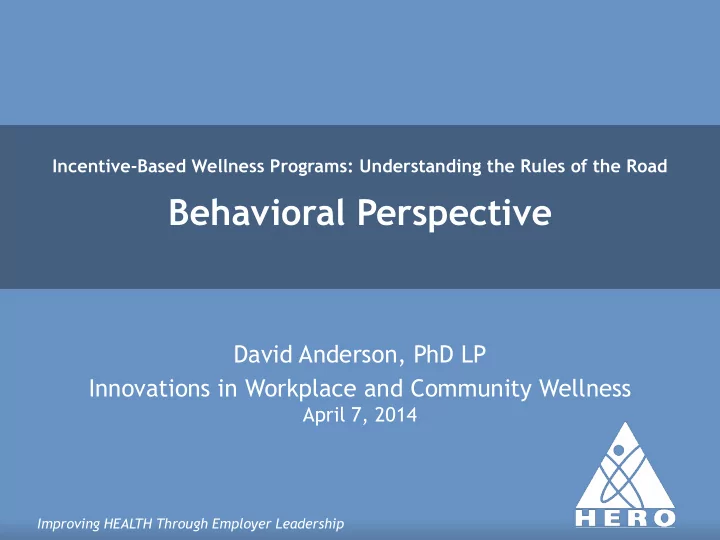

• Click to edit Master text styles Incentive-Based Wellness Programs: Understanding the Rules of the Road – Second level Behavioral Perspective • Third level – Fourth level » Fifth level David Anderson, PhD LP Innovations in Workplace and Community Wellness April 7, 2014 Improving HEALTH Through Employer Leadership
David R. Anderson, PhD LP • HERO – Chairman, Research Committee – Member, Board of Directors – Founding member • StayWell Health Management – EVP & Chief Health Officer – Co-founder Improving HEALTH Through Employer Leadership
What Drives Behavior? • Psychology 101 – “Animal Drives” – Drive 1: biological drives like food, water, sex – Drive 2: reward/punishment, i.e. extrinsic motivation • Psychology 201 – “Human Needs” – Drive 3: intrinsic motivation • Highest levels in Maslow’s hierarchy of needs • Autonomy, competence, relatedness – Self-determination theory – Deci & Ryan • State of absorption in an activity for its own sake – Sense of engagement, happiness, fulfillment, timelessness – Optimal level called “flow” by Mihaly Csikszentmihalyi Improving HEALTH Through Employer Leadership
Extrinsic vs. Intrinsic – Why Care? • Controlled vs. Autonomous Motivation – Controlled: Seduced, coerced, pressured – Autonomous: Volition, endorsement, interest, deeply valued – Some even choose to die for valued beliefs • Limits of “wellness incentives” – Controlled motivation buys compliance – Compliance depends on incentive Improving HEALTH Through Employer Leadership
What’s the Evidence on Incentives? Incentives increase short-term compliance HA, activity participation, simple short-term actions – Long- term change requires “intrinsic motivation” or large ongoing incentive Large external incentives may decrease intrinsic motivation – People work long and hard for valued goals Health is not a “passion” motivating most people until it’s gone – Large outcome-based financial incentive may increase perceived value – of employer’s health goals… but little evidence yet exists Initial compliance may become intrinsic over time – Requires strong cultural alignment , e.g. seat belt use, smoking Improving HEALTH Through Employer Leadership
Smoking Trends Among U.S. Adults 45% 42.4% 37.4% 37.1% 33.2% 35% 30.1% 25.5% 24.7% 25% 22.8% 20.8% 19.3% 18.0% 15% 1965 1970 1974 1980 1985 1990 1995 2001 2006 2010 2012 Source: National Health Interview Surveys, 1965 – 2012. Improving HEALTH Through Employer Leadership
Supportive Environment Matters Impact of Culture and Communications 100% Weaker Strong HA Participation Rate (%) 80% 69% 65% 60% 53% 51% 51% 44% 41% 41% 37% 40% 33% 33% 27% 20% 0% Comm. Culture Comm. Culture Comm. Culture Non-Cash Cash Benefits-Integrated Incentives Incentives Incentives n=4 n=16 n=16 Reference: Seaverson ELD, Grossmeier J, Miller TM, Anderson DR. The role of incentive design, communications strategy and worksite culture on health assessment participation. American Journal of Health Promotion, 2009;23:343-352. Improving HEALTH Through Employer Leadership
The “Three Pillars” of Engagement Improving HEALTH Through Employer Leadership
ACA Regulations and Wellness • Incentives are NOT a wellness program – Large incentives are health plan design feature • ACA driving rapid growth in incentives – Usage, amounts, requirements – Trend toward outcome-based designs • Behavioral and policy issues – Limited evidence of long-term behavioral impact – Concerns: fairness, trust, extrinsic motivation Improving HEALTH Through Employer Leadership
Reasonably Designed Wellness Program Guidance for a reasonably designed employer-sponsored wellness program using outcomes-based incentives: Consensus statement of the Health Enhancement Research Organization (HERO), American College of Occupational & Environmental Medicine (ACOEM), American Cancer Society and American Cancer Society Action Network, American Diabetes Association, and American Heart Association . Journal of Occupational and Environmental Medicine . 2012;54(7):889-896. Improving HEALTH Through Employer Leadership
Recommend
More recommend